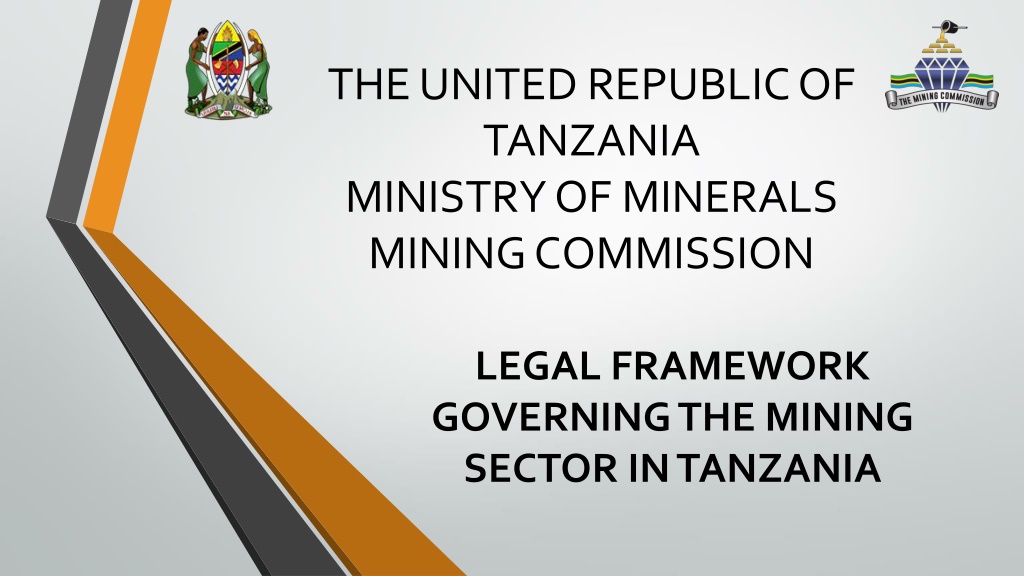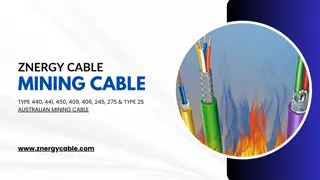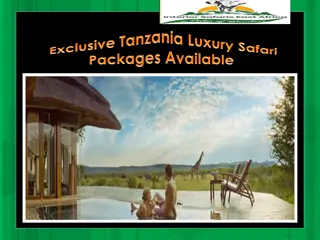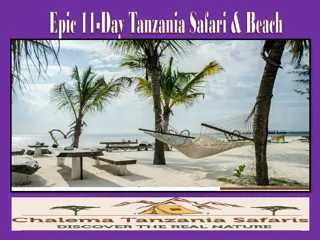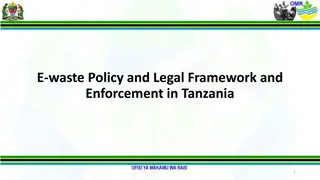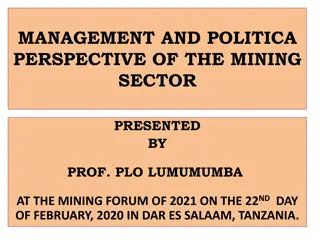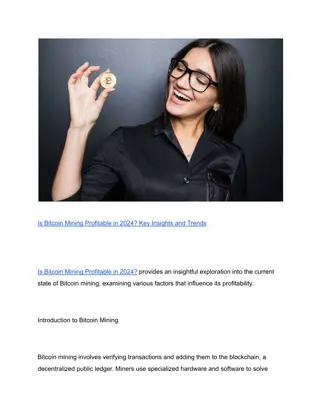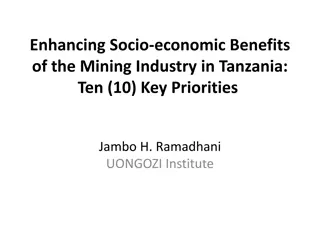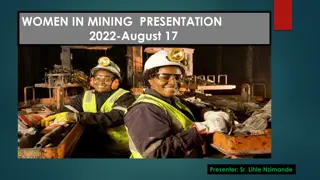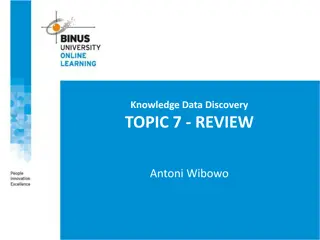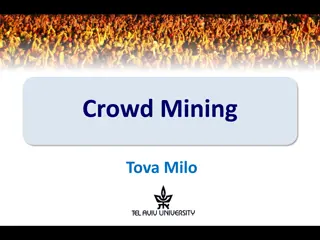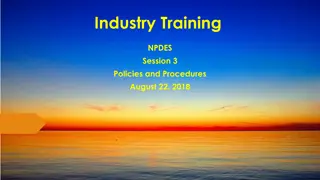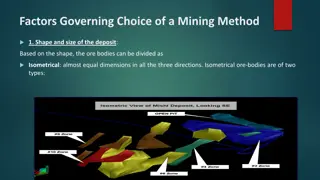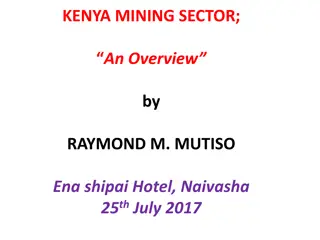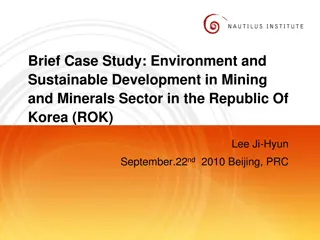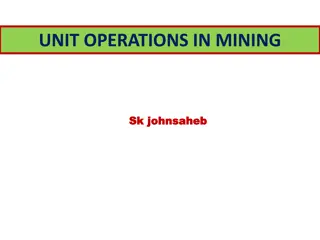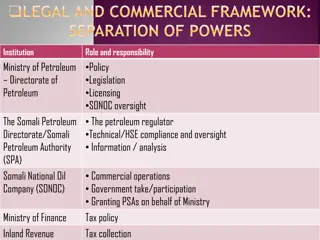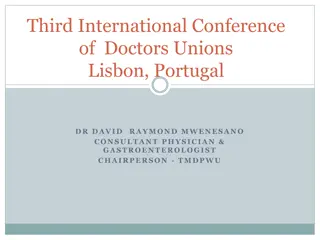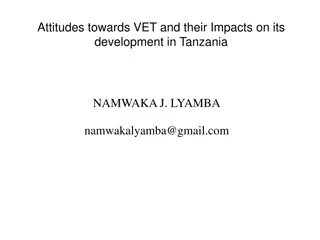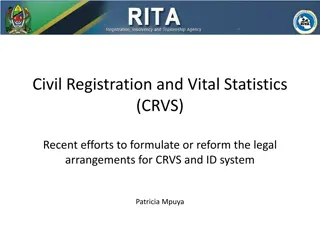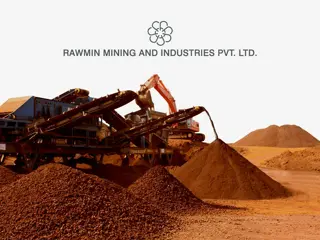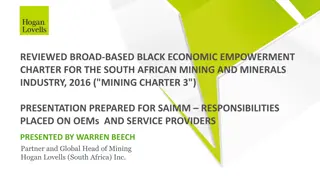Legal Framework for the Mining Sector in Tanzania
The legal framework governing the mining sector in Tanzania is based on the Mining Act, Cap. 123, which regulates various aspects such as prospecting, mining, mineral processing, environmental compliance, and more. It outlines key issues including state control over mineral rights, acquisition of mineral rights by private individuals, and legal disqualifications for acquiring mineral rights. The Mining Act establishes the Mining Commission as the licensing authority and enforces penalties for mining without a valid license.
Download Presentation

Please find below an Image/Link to download the presentation.
The content on the website is provided AS IS for your information and personal use only. It may not be sold, licensed, or shared on other websites without obtaining consent from the author. Download presentation by click this link. If you encounter any issues during the download, it is possible that the publisher has removed the file from their server.
E N D
Presentation Transcript
THE UNITED REPUBLIC OF TANZANIA MINISTRY OF MINERALS MINING COMMISSION LEGAL FRAMEWORK GOVERNING THE MINING SECTOR IN TANZANIA
Objectives of the Presentation To demonstrate to attendees key legal and regulatory issues governing the mining sector in Tanzania. To highlight key issues on environmental compliance in the mining sector.
THE MINING ACT, CAP 123 The Mining Act No.14 of 2010 is a principal legislation governing the mining sectorinTanzania. Until now, the law has been amendedten (10)times. Amendments have been made to strengthen the legal and regulatory framework for the mineral sector and enhance the capacity for monitoring andenforcement.
Main Regulatory Areas in the Mining Sector The law contains provisions that regulate the mineral sector in these areas: Prospecting for minerals Mining Mineral Processing Dealing in Minerals Environmental Matters Grant, Renewal, and Termination of Minerals Rights Payment of Royalties, Fees, and other charges.
Key Legal Issues Under The Mining Act Keylegal andregulatoryissues governing the mining sectorinTanzania: 1. StateControlOver Mining Rights. 2. Acquisition ofMineral Rights by Private Persons. 3. DurationofMinerals Rights. 4. Renewal ofMineral Rights. 5. Transfer ofMineral Rights. 6. Ownership ofMineral Rights by ForeignPersons 7. Termination ofMinerals Rights 8. EnvironmentalCompliancein MiningOperations.
State Control Over Mineral Rights Under the Mining Act, all mineral resources in Tanzania are public property held by the President in trust for the people ofTanzania. Private persons can only prospect for minerals, mine, or otherwise deal in minerals if they hold a valid mineral right granted by the licencing authority (The Mining Commission). The law creates a punishable crime for persons who prospect or mine without a valid licence. How doprivate persons acquire minerals rights?
Acquisition of Mineral Rights: Legal Disqualifications Individuals Minors. Not being Tanzanian or resident in Tanzania for fouryears. Declaredbankrupt. Convicted, within the previous ten years, of an offence of which dishonesty is an element, and has been sentenced to imprisonment or to a fine exceedingtwentymillion shillings. Companies Company has not established a physical and postal address in the United Republic for the purposeofservinglegal notices. Company is not incorporated Companies Act and doesn t intend to carry out thebusinessofmining undera mining licence. Inliquidation. Has a director or shareholder that lacks the last twoqualifications for individual applicants. under the
Types of Mineral Rights Under the Mining Act, a total of eight (8) mineral rights can be granted to qualified persons, as follows: Prospecting Licence. Gemstone Prospecting Licence. Special Mining Licence. Mining Licence. Primary Mining Licence. Processing Licence. Smelting Licence. Refining Licence.
Duration and Renewal of Mineral Rights Duration ProspectingLicence(4+ 3 + 2 years). Special Mining Licence (Life of ore body or requested period). Renewal for a period not exceeding the estimated life of the remaining ore body. Mining Licence (10 + requested period not exceeding10 years). Primary MiningLicence (7 + renewal). ProcessingLicence(10 + renewal) SmeltingLicence(25+ renewal) RefiningLicence(25+renewal) Cut-off time for Renewal Prospecting Licence (one month before the expiry date ofthe licence) Special Mining Licence (one year before the expiry date ofthe licence). Mining Licence (six months before the expiry date of the licence). Primary Mining Licence. (Three months before the expiry date ofthe licence). Processing Licence (law silent, application for renewal shouldbemadebeforeexpiry ofthe licence). Smelting Licence (law silent, application for renewal shouldbemadebeforeexpiry ofthe licence). Refining Licence (law silent, application for renewal shouldbemadebeforeexpiry ofthe licence).
Transfer of Mineral Rights The lawallowsholders of mineralrightsto assignsuch rightsto other persons. Consent of the Mining Commission is required for assignment of mining licence or special mininglicence. Consent canbewithheldunless: 1) There is a proof that substantial developments have been effected by the holder of mineral right inaccordance withthe programme ofmining operations. 2) There isaTaxClearanceCertificate issuedbyTRA. 3) There isaproof that other charges, feesandpayableshave beencleared. Consent of theCommission isnot required for anassignment to: 1) Affiliatecompanies. 2) Financial institutions by way of mortgage or charge given as security for any loan or guarantee inrespect ofmining operations. 3) Another personwho constitutes the holderof the specialmininglicence orthe mining licence.
Ownership of Mineral Rights by Foreign Persons Subject to a few exceptions under the law, mineral rights can be granted to both Tanzaniansandforeigners who fulfil licencing requirements. However, foreign persons cannotbe granted these mineral rights: 1) Primary Mining Licence.The lawallows alicence holder to contract aforeignerfor technical support. 2) Mining licence for mining gemstones can be granted to Tanzanians only. However, where the Minister for Minerals determines that the development of gemstone resources in an area of land subject to a mineral right, is most likely to require specialized skills, technology or high level of investment, he may grant a mining licence for gemstones to the applicant, where he is satisfied that the licence will be held by that person together with a non-citizen whose undivided participating shares amounttonot more thanfifty percent.
TENURE OF MINERAL RIGHTS Suspension and Cancellation Failure to comply with the law or regulations binding on the Licencee. Failure to comply with a non-exempted condition of the licence. Failure to comply with a direction lawfully given under the law or with a condition on which any certificate of surrender is issued or on which any exemption or consent is given underthe law. Failuretocomply withtheconditionsrelatingtotheexercise of his rights under his licence which are contained in a relevant development agreement. Surrender The holder of a mineral right can surrender all or any part of the land subject to his licence by applying to the licensing authority not less than three months before the date on which he wishes the surrender to have effect, for a certificate of surrender, and the licensing authority shall issue to the applicant a certificate of surrender either unconditionally or subject to such conditions surrendered land as the licensing authority may determine. relating to the
Suspension or Cancellation of a Mineral Right: Due Process The law prescribes procedures to be followed before suspension or cancellation ofamineral right, asfollows: Default notice specifying the grounds on which the licence is liable to be suspended orcancelled. The licencee has failed within a period of thirty days from the date on which the default notice was served or such longer period as the licensing authority mayallow to remedythe defaultspecified. However, the Licensing Authority may, by notice in writing to the holder of a mineral right, cancel the relevant licence on the occurrence of an event which wouldrenderthat personineligible tobe granted amineral right.
Surrender of Whole Land Subject to a Mineral Right Leads to Cancellation Where the Mining Commission issues a certificate of surrender that relates to the whole of the land subject to the holder s licence, the mineral right shall be cancelled with effect from the same date, and in any other case, the licence shall be amended to take account of the surrender. Insome instances,theMiningCommissionmayrefuse toissuesurrender certificatedue to: Anapplicantindefault. An applicant who fails to comply with the reasonable application requirements for surrender. Surrendered landdoesn tconformtotherequired environmentalprotectionstandards. For partial surrenders, the remaining land is incapable of being efficiently used or developed accordingto theterms ofthelicence.
Dispute Settlement: Protection of Mineral Rights For prospecting and mining operations to run smoothly, the Mining Act and the Mining (Dispute Resolution) Rules, 2021, Government Notice No. 323 published on 16/4/2021 prescribe a dispute settlement mechanism under the authority of the Executive Secretary ofthe MiningCommission. The Commission may inquire into and decide all disputes between persons engaged in prospecting or mining operations, either among themselves or in relation to themselves andthirdparties otherthantheGovernment. Disputes must be in relation to: land boundaries, construction of water-related infrastructure or the right to use water in mining operations, and resettlement compensation. In deciding disputes, the Commission can make enforceable orders that can be executed at alocalResidentMagistrate sCourt. Dissatisfied persons can appeal the commissions order to the High Court in 30 days time from decisiondate.
Environmental Compliance in Mining Operations The Environmental Management Act is the governing legislation on environmental matters in Tanzania. Thelawrequiresallpersons toprotecttheenvironment. The Mining Act obligates licencees to comply with environmental principles and safeguards prescribed in theEnvironmental ManagementActandotherrelevantlaws The Act requires all persons engaged in mining activities to undertake a compulsory environmental impact assessment(EIA)before thecommission oftheproject. TheMiningAct toorequiresanEIACertificatebefore agrantofamineral right. All granted mineral rights contains conditions on environmental management plan which must be enforced throughoutthelifeofthemine. The Mining Commission enforces two regulations: The Mining (Safety, Occupational Health and Environment Protection) Regulations of 2010 and The Mining (Environmental Protection for Small Scale Mining) Regulations of 2010 to make sure that the management of production, transportation, storage, treatment and disposal of waste arising out of mining operations is carried out in accordance with environmentalprinciples andsafeguardsprescribed undertheEnvironmentalManagementAct. Further, the Commission ensures compliance through: inspection of mines; supervision of explosive stores; review ofmine closure plans;andtrainingon occupational health,safety, andenvironmental protection.
Sustainability of Tanzania's Mining Industry World demand for metals and industrial minerals is not waning; the demandis huge. With its unique geological advantage and vast deposits of untapped mineral resources, the contribution of the mining industry to Tanzania's economicgrowthis expected to rise in the next decade. Extraction of metals and industrial minerals must be done sustainably by giving consideration to people, the environment,andtheeconomy.
For the mining industry to have a positive impact with less negative impact on the three interrelated dimensions of sustainability: we need to do the following. 1. Effective enforcement of the regulatory legal framework. 2. Promote investment in the mining industry through dissemination of geo- data, information, and maps. 3. GST should be encouraged to continue undertaking geological mapping of Tanzania so that the public receive useful data on the geology and mineral resources in the country. 4. Mining companies should implement local content law especially on technical know-how by recruiting Tanzanians and train them to work in all phases of mining operations to enable technology transfer and acquisition of skills.
THANK YOU FOR LISTENING
